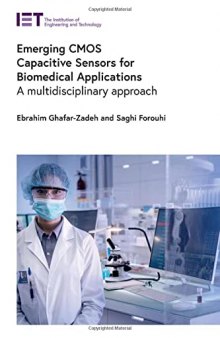 جزییات کتاب
جزییات کتاب
CMOS-based sensors offer significant advantages to life science applications, such as non-invasive long-term recordings, fast responses and label-free processes. They have been widely applied in many biological and medical fields for the study of living cell samples such as neural cell recording and stimulation, monitoring metabolic activity, cell manipulation, and extracellular pH monitoring. Compared to other sensing techniques, capacitive sensors are low-complexity, high-precision, label-free sensing methods for monitoring cellular activities such as cell viability, proliferation and morphology. The development of capacitive sensors for use in life sciences requires thorough knowledge of both the intended biological applications and CMOS circuitry. This book addresses the principles, design, implementation and testing, and packaging of CMOS circuits for these applications. Existing applications, markets, and potential future developments are also covered, plus the relevant biological protocols. Emerging CMOS Capacitive Sensors for Biomedical Applications provides information and guidance for researchers and advanced students in the field of microelectronics who are looking to specialise in biological applications. It is also relevant to academic and industrial researchers already working in the biosensors field, who wish to expand their knowledge and keep abreast of new developments.



 دانلود کتاب
دانلود کتاب

 جزییات کتاب
جزییات کتاب





 این کتاب رو مطالعه کردید؟ نظر شما چیست؟
این کتاب رو مطالعه کردید؟ نظر شما چیست؟
